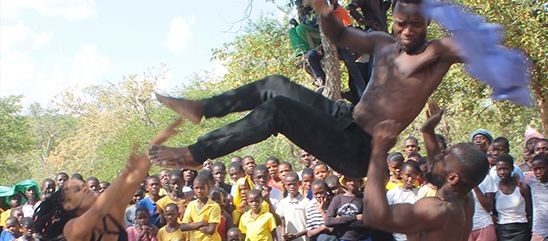ADDRESSING GENDER-BASED VIOLENCE WITH YOUNG PEOPLE
Since the beginning of the year, The Ombetja Yehinga Organisation (OYO) has focused its efforts on Gender-Based Violence, building on the work done in 2022. It has developed a program where it first reaches the whole school with its dance troupe, to ensure all the learners have the basic information and know who to turn to should they need any support, and then works with groups of 40 learners using the photo project ‘the caring Namibian man’ and clip ‘be a lady’ and ‘be a man’ to have in-depth conversation about masculinity, femininity and gender roles.
‘This project allows us to look at GBV from a different angle’ explains Dr Talavera, director ‘instead of only focusing on the bad: men as perpetrators, men as violent, etc. – we try and encourage young people to think about the type of men – and women – they would want to become. Not all men are bad and it is important to discuss positive masculinity too.’
In the Kunene region in particular, some baseline information were gathered, including:
- Braunfels Secondary School: it is a rural school outside the town of Khorixas. In that school, boys were clearly divided into two groups: on the one hand some boys were extremely conservative, thinking that ‘to show a woman you love her you must beat her a bit when she makes a mistake’, and on the other hand some boys were more opened to the idea of gender equality. It led to many debates during the session. To the question ‘what type of women would you like to marry’ in the end some boys from the first group were still in favour of marrying girls who are not educated so that they won’t talk back to them and just stay at home and be obedient. More activities are needed with this group.
- Outjo Secondary School: boys in this school had long discussions about the photos of men carrying babies on their back. They felt it was something they could not do in public and that it shows sign of weakness, maybe even disrespect towards women. The facilitator explained that times are changing and asked the boys what they felt is needed for them to become part of the change. They all agree that nowadays women can be principals or drive cars but they felt that more education was needed for both girls and boys.
- Omuhonga Combined School: this was the first school with girls as part of the discussion and girls were strongly opposed to the idea of men washing clothes for instance. They felt it was not possible for men to wash clothes, not even their own clothes. It echoes the sentiment from Outjo Secondary School that education needs to target both men and women.
Schools really enjoy the project:
- ‘Gender based violence was expressed through the Arts and the audience has shown great interest in following the storylines. Learners could not stop applauding.’ Life skills teacher, Evululuko Secondary School
- ‘The activity highlighted the causes of GBV, what restraining orders are, the duties of social workers, (and addressed) alcohol and romantic relationships. It was all well dramatized and explained.’ Life skills teacher, Nangolo Secondary School
As the campaign continues, we would like to thank the Embassy of Finland for supporting the initiative in the Ohangwena, Omusati and Oshana regions and UNFPA/ Regain Trust for supporting the initiative in the Khomas and Kunene regions.
When you subscribe to the blog, we will send you an e-mail when there are new updates on the site so you wouldn't miss them.


